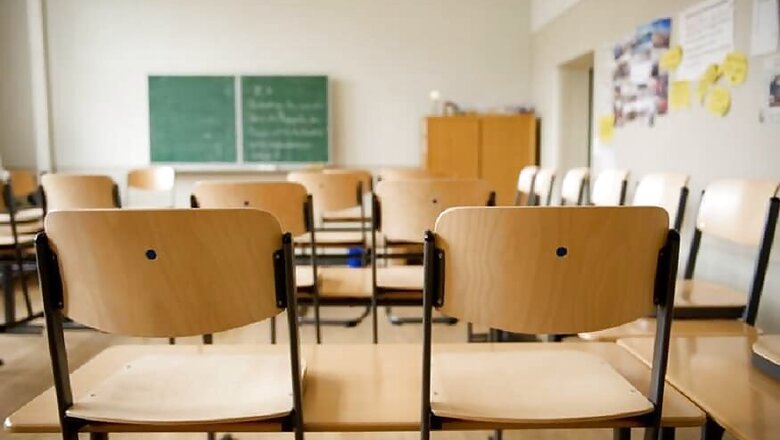
views
The private school sector is facing some harsh realities as India unlocks in fits and starts. If the economic crisis, which was already brewing before Covid-19 came along, worsens, private schools with little liquidity may be forced to shut down. A study titled 'State of the Sector Report, Private Schools in India' by non-profit Central Square Foundation raises an alarm regarding this impending reality and pegs uncollected fees at crores.
It calls for policy measures to resuscitate the situation for the private schools with ed-tech and providing the institutions an MSME tag.
Nearly, 50% of all students in India are enrolled today in the 4.5 lakh privately managed schools across the country (U-DISE 2019). The report was filed keeping in mind that “while the policy ecosystem devises reforms to bring quality education to low income students through the government systems, many low and middle income Indian families are seeking private schools as alternatives”.
Explaining further, it said, “A state of the sector report on private schools – private schooling has become a widespread phenomenon in India – dominating urban schooling and making significant inroads into the way rural children study. The large and heterogeneous sector is often misunderstood as a niche sector primarily for the elite. Research findings on private schools are not known and regulatory focus is limited to inputs or fee control rather than improving outcomes.”
To break from this stereotype and define policies for private schooling in India, the non-profit conducted the survey.
Key findings
Low-fee schools have seen a significant impact on revenue due to school closures, examination postponement, and widespread non-payment of fees for this period. The team found that none of the private schools reported that they collected fees during the lockdown, “but around 25% parents report paying fees”.
The fee collection cycles in private schools depend on the start and end of the school academic year; parents often wait until March-April till the end-of-the-year examinations, to pay the academics year’s dues.
“More than 50% school owners surveyed have uncollected fees, to the tune of Rs 4 lakh to Rs 4.8 crore due from the previous year, accounting for 13% to 80% of annual revenue,” said the report.
Some states including Tamil Nadu and Maharashtra ordered schools to refrain from collecting fees during the lockdown, forcing the institutions to forgo a large share of their annual fees, and not just the monthly fees for March and April. Haryana, Telangana, Delhi and Madhya Pradesh allowed schools to charge only tuition fee and Maharashtra warned schools of strict action if they withheld staff salaries.
“Nearly 50% school leaders are considering a shift in pricing models in the upcoming year. They mentioned fee discounts/fee deferrals, pay cuts for staff and increasing class sizes as possible ideas,” said the report
As per the findings: “Financial distress for schools will continue even after re-opening as they anticipate drop in enrolments. A significant proportion of parents surveyed say they may have to switch schools for the coming academic year.”
Another fallout expected is that enrolment in private schools may decrease in the short term. "Thousands of families migrated to their hometowns during the lockdown and might not re-enroll their children in the same schools next year,” the report said.
Some parents might enrol their children in government school for this academic year. “If the economic crisis worsens, private schools with little liquidity may be forced to shut down,” said the report.
The survey captures the voices of the teachers and service providers who depend on schools for their livelihood and they expressed how they have experienced significant financial impact due to loss in school revenue.
“Nearly 50% teachers didn’t receive their salary for March despite schools closing only in mid-March. Less than 20% teachers from private schools continued to receive their salaries after March,” said the report’s key findings.
In order to sustain themselves, “A few teachers in Telangana have found other means to earn their wages in the interim, including agriculture work, enrolling in MNREGA programs and manual labor,” it said.
School services providers rely on the school-fee cycle and the timing of the closure has affected their revenues.
Learning continuity disrupted
While the majority of schools are attempting digital transitions through low-tech, WhatsApp-based tools or video classes, only 33% parents can support their children with digital education, and none of the teachers surveyed find current forms of online instruction effective, the study found.
Research on the effect of natural disasters on learning outcomes suggests that disasters impact lifelong earnings. Schools started using digital learning platforms to ensure learning continues during the lockdown.
“More than 66% of the surveyed private schools have adopted WhatsApp as the mode for digital provisions of teaching,” as per the report.
Schools are worried about enforcing online learning and setting in place accountability systems since many students don’t have access to smartphones and internet. Teachers have adapted to online teaching and monitoring through WhatsApp groups even with reduced or no pay during the lockdown.
“Nearly 50% teachers engage in teaching-learning through WhatsApp,” said the report.
Teachers felt that slow learners and younger children were most affected by this shift due to the lack of personalised attention and the absence of immediate feedback.
With this the parents also have new roles to support home-based learning through online tools including allocating screen time, managing the learning environment and supporting younger children with learning tasks.
“Nearly 33% parents can support their children with online learning at home,” the report said.
Parents opine that key barriers to online learning are the lack of one-on-one teacher interaction, and managing learning discipline, especially for younger children.
Service providers quickly adapted to stay engaged with schools and parents by tweaking their existing solutions, adding technology-based products and providing complementary services. Some providers pivoted to support teachers, and school and school leaders with tools for online teaching. “Service providers are attempting to provide low-cost products, with some pegging the latter at the schools’ typical transport fee,” said the report.
Organisations working on socio-emotional skills have curricula and resources to support teachers and students with the skills required to navigate the current crisis.
Initial feedback on digital learning products seems promising. Though not seen as effective substitutes, teachers and parents feel they may be useful supplements to in-class learning.
Crisis policy response
The sector report has suggested that private schools require urgent support on both the learning and financial fronts, in the form of active dissemination of edtech products and learning solutions DIKSHA to private schools', relaxation of regulatory restrictions on operations and fees to allow the sector to recover from losses, and easy credit availability to private schools by including them in MSME so they can avail of loan guarantees.


















Comments
0 comment